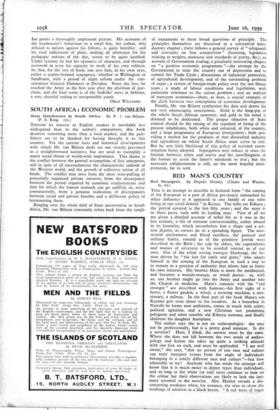SIR IAN HAMILTON LOOKS BACK
GEORGE MEREDITH would have appreciated this book: its vivacity of expression, its occasional intolerance, and its air of gallant panache would have seemed to him typical of the Celt, especially of the Celt turned soldier (witness the Colonel in The Egoist). The things which, to Meredith, the Saxon represented—humdrum, sordidness, false sentiment, hypocrisy —are obviously so alien from Sir Ian Hamilton that he never troubles to condemn them, except by implication. And even these implications are made at his own expense, when ha exhibits himself as tempted, once or twice, to fall below the Meredithian-Celtic standard Once, he improbably avers, he nearly became a snob, on the strength of having remarked that a man must be a gentleman who bought his shirts from a certain Bond Street outfitter, or of having derived an immense satisfaction at being driven from Cheam school to London in a State coach by a powdered coachman with two powdered footmen in attendance. He suggests that he might have become a " straphanger " had he gone to Eton instead of pro- ceeding to idle outrageously, so he insists, at Wellington, where Dr. Benson caned him energetically but fruitlessly every Monday. Yet, of course, being a Celt—the staid Hamilton in him freely shot with streaks of Cameron oddity and Vereker impulsiveness—his true faith has been in his star : and, look- ing back over eighty-six years, he finds that his faith has been justified. The pleasure that one gets from this book is due to its freshness and directness of its vision—the mental vision of a bard recounting a saga, moralising only occasionally, and never sentimentalising or delving darkly in psychological recesses.
These reminiscences are, indeed, the first part of the saga of Ian Hamilton, which began when a baby, born in Corfu to a Gordon High:ander, opened its eyes upon the breast of a Greek nurse in its grandfather's home near Dimoon. In the first two chapters Sir Ian captures the whole spirit of a childhood spent in the spacious and semi-feudal atmosphere of a Scottish country Louse during the eighteen-fifties, amid the swish of crinolines, the weeping of whiskers and a host of retainers who, in a child's eyes, were the most important members of the household. Nothing very startling happens in those chapters, but the brightness of the total picture is very striking. From John the coachman and Miller the tyrant of the kitchen, to Aunt Camilla, presiding over Sunday tea and prayers in the gunroom, and formidable Uncle Bassett, who punctuated his talk with loud " Ta-ra-rums," the per- sonages are all alive ; and they are gloriously gathered in the conversation piece of a " going to kirk " in the family omni- bus, all in their best clothes—a weekly outing which involved the two-hour services with a heavy picnic lunch in between. This childhood, idyllic in spite of childish crimes and penalties, came to an abrupt end for the hero of this saga when, at the age of ten, clothed in trousers instead of a kilt, he was plunged without preparation into the crueller world of Cheam. Of that school, as it was under R. S. Tabor, s4
Ian paints a thoroughly unpleasant picture. His accounts of the headmaster's behaviour to a small boy, the author, who refused to inform against his fellows, is quite horrible : and his total indictment of place, making all allowance for the pedagogic notions of the day, seems to be quite justified. Under tyranny he lost his openness of character, and through overwork in term his capacity to work of his own volition. So that, for the rest of book, one sees him, in his own eyes, rather a scatter-brained scapegrace, whether at Wellington or Sandhurst, with a period of slight reform under the con- scientious General Dammers at Dresden. None the less, he reached the Army in the first year after the abolition of pur- chase, and the final scene is of the Suffolks' mess at Athlone, a very cheerful ending to irresponsible youth.
ORLO WILLIAMS.























































 Previous page
Previous page